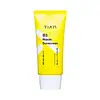What's inside
What's inside
 Key Ingredients
Key Ingredients

 Benefits
Benefits

 Concerns
Concerns

 Ingredients Side-by-side
Ingredients Side-by-side

Water
Skin ConditioningDibutyl Adipate
EmollientPropanediol
SolventMethylpropanediol
SolventTerephthalylidene Dicamphor Sulfonic Acid
UV Absorber1,2-Hexanediol
Skin ConditioningEthylhexyl Triazone
UV AbsorberNiacinamide
SmoothingPolymethylsilsesquioxane
Polysilicone-15
UV FilterTrimethylpentanediol/Adipic Acid/Glycerin Crosspolymer
Skin ConditioningTromethamine
BufferingCaprylyl Methicone
Skin ConditioningCetearyl Alcohol
EmollientDiethylamino Hydroxybenzoyl Hexyl Benzoate
UV FilterPolyglyceryl-3 Distearate
EmulsifyingMethyl Trimethicone
Skin ConditioningBis-Ethylhexyloxyphenol Methoxyphenyl Triazine
Skin ConditioningGlyceryl Stearate
EmollientPotassium Cetyl Phosphate
EmulsifyingAcrylates/C10-30 Alkyl Acrylate Crosspolymer
Emulsion StabilisingVp/Va Copolymer
Polyether-1
Alpha-Arbutin
AntioxidantCarbomer
Emulsion StabilisingDimethicone/Vinyl Dimethicone Crosspolymer
Skin ConditioningGlyceryl Stearate Citrate
EmollientPolyacrylate Crosspolymer-6
Emulsion StabilisingDimethicone Crosspolymer
Emulsion StabilisingGlycerin
HumectantAdenosine
Skin ConditioningCitrus Aurantium Bergamia Fruit Oil
MaskingPelargonium Graveolens Flower Oil
MaskingDisodium EDTA
Limonene
PerfumingCitronellol
PerfumingLinalool
PerfumingTranexamic Acid
AstringentGeraniol
PerfumingHydrogenated Lecithin
EmulsifyingPolyglyceryl-10 Stearate
Skin ConditioningPanthenol
Skin ConditioningSodium Ascorbyl Phosphate
AntioxidantTocopheryl Acetate
AntioxidantRose Flower Oil
MaskingGlyceryl Arachidonate
EmollientGlyceryl Linolenate
EmollientBiotin
AntiseborrhoeicFolic Acid
Skin ConditioningPyridoxine
Skin ConditioningRetinyl Palmitate
Skin ConditioningThiamine Hcl
MaskingCyanocobalamin
Skin ConditioningWater, Dibutyl Adipate, Propanediol, Methylpropanediol, Terephthalylidene Dicamphor Sulfonic Acid, 1,2-Hexanediol, Ethylhexyl Triazone, Niacinamide, Polymethylsilsesquioxane, Polysilicone-15, Trimethylpentanediol/Adipic Acid/Glycerin Crosspolymer, Tromethamine, Caprylyl Methicone, Cetearyl Alcohol, Diethylamino Hydroxybenzoyl Hexyl Benzoate, Polyglyceryl-3 Distearate, Methyl Trimethicone, Bis-Ethylhexyloxyphenol Methoxyphenyl Triazine, Glyceryl Stearate, Potassium Cetyl Phosphate, Acrylates/C10-30 Alkyl Acrylate Crosspolymer, Vp/Va Copolymer, Polyether-1, Alpha-Arbutin, Carbomer, Dimethicone/Vinyl Dimethicone Crosspolymer, Glyceryl Stearate Citrate, Polyacrylate Crosspolymer-6, Dimethicone Crosspolymer, Glycerin, Adenosine, Citrus Aurantium Bergamia Fruit Oil, Pelargonium Graveolens Flower Oil, Disodium EDTA, Limonene, Citronellol, Linalool, Tranexamic Acid, Geraniol, Hydrogenated Lecithin, Polyglyceryl-10 Stearate, Panthenol, Sodium Ascorbyl Phosphate, Tocopheryl Acetate, Rose Flower Oil, Glyceryl Arachidonate, Glyceryl Linolenate, Biotin, Folic Acid, Pyridoxine, Retinyl Palmitate, Thiamine Hcl, Cyanocobalamin
Water
Skin ConditioningAlcohol Denat.
AntimicrobialEthylhexyl Methoxycinnamate
UV AbsorberDipropylene Glycol
HumectantGlycerin
HumectantGlycol Dimethacrylate Crosspolymer
Butylene Glycol
HumectantSodium Hyaluronate
HumectantHydrolyzed Collagen
EmollientArginine
MaskingBis-Ethylhexyloxyphenol Methoxyphenyl Triazine
Skin ConditioningEthylhexyl Triazone
UV AbsorberAcrylates/C10-30 Alkyl Acrylate Crosspolymer
Emulsion StabilisingMelaleuca Alternifolia Leaf Oil
AntioxidantBis-PEG-18 Methyl Ether Dimethyl Silane
EmollientPolystyrene
Disodium EDTA
Xanthan Gum
EmulsifyingPolyvinyl Alcohol
Methylparaben
PreservativeWater, Alcohol Denat., Ethylhexyl Methoxycinnamate, Dipropylene Glycol, Glycerin, Glycol Dimethacrylate Crosspolymer, Butylene Glycol, Sodium Hyaluronate, Hydrolyzed Collagen, Arginine, Bis-Ethylhexyloxyphenol Methoxyphenyl Triazine, Ethylhexyl Triazone, Acrylates/C10-30 Alkyl Acrylate Crosspolymer, Melaleuca Alternifolia Leaf Oil, Bis-PEG-18 Methyl Ether Dimethyl Silane, Polystyrene, Disodium EDTA, Xanthan Gum, Polyvinyl Alcohol, Methylparaben
Ingredients Explained
These ingredients are found in both products.
Ingredients higher up in an ingredient list are typically present in a larger amount.
Acrylates/C10-30 Alkyl Acrylate Crosspolymer is a synthetic polymer. It is used to thicken and improve the texture of products. Due to its properties, it can prevent water and oil ingredients from separating.
You might know this ingredient as Tinosorb S or Bemotrizinol. It is a UV filter that covers both UVA and UVB rays.
This ingredient has two peak UV absorption peaks ( 310 and 340 nm) and is able to absorb both UV-A and UV-B rays. This ingredient works by preventing UV rays from reaching and damaging your skin.
On top of that - it is highly photostable and helps prevent the photodegration of other sunscreen ingredients such as avobenzone.
Tinosorb S is allowed in the EU, Australia, and Asia. It is close to being approved by the FDA and we'll hopefully get this ingredient in the U.S. by late 2025.
Fun fact: Tinosorb S is the most effective UV absorber at maximum concentration (measured by SPF) permitted in the EU.
This ingredient is oil-soluble, so your oil-cleansers will take this right off at night.
Learn more about Bis-Ethylhexyloxyphenol Methoxyphenyl TriazineDisodium EDTA plays a role in making products more stable by aiding other preservatives.
It is a chelating agent, meaning it neutralizes metal ions that may be found in a product.
Disodium EDTA is a salt of edetic acid and is found to be safe in cosmetic ingredients.
Learn more about Disodium EDTAEthylhexyl Triazone is a modern chemical sunscreen that protects from UV-B radiation.
It is the most effective of existing UV-B filters, as it provides the highest level of photo-stable absorption. It protects from the entire UV-B range (280 to 320nm), with it's highest level of protection at 314nm.
Ethylhexyl Triazone is oil soluble, oderless and colorless, which mean it is able to be incorporated into a variety of different formulations.
It is not currently available within the United States due to slow changing FDA regulations. Outside of the US, it is used in formulations at concentrations up to 5%.
Learn more about Ethylhexyl TriazoneGlycerin is already naturally found in your skin. It helps moisturize and protect your skin.
A study from 2016 found glycerin to be more effective as a humectant than AHAs and hyaluronic acid.
As a humectant, it helps the skin stay hydrated by pulling moisture to your skin. The low molecular weight of glycerin allows it to pull moisture into the deeper layers of your skin.
Hydrated skin improves your skin barrier; Your skin barrier helps protect against irritants and bacteria.
Glycerin has also been found to have antimicrobial and antiviral properties. Due to these properties, glycerin is often used in wound and burn treatments.
In cosmetics, glycerin is usually derived from plants such as soybean or palm. However, it can also be sourced from animals, such as tallow or animal fat.
This ingredient is organic, colorless, odorless, and non-toxic.
Glycerin is the name for this ingredient in American English. British English uses Glycerol/Glycerine.
Learn more about GlycerinWater. It's the most common cosmetic ingredient of all. You'll usually see it at the top of ingredient lists, meaning that it makes up the largest part of the product.
So why is it so popular? Water most often acts as a solvent - this means that it helps dissolve other ingredients into the formulation.
You'll also recognize water as that liquid we all need to stay alive. If you see this, drink a glass of water. Stay hydrated!
Learn more about Water